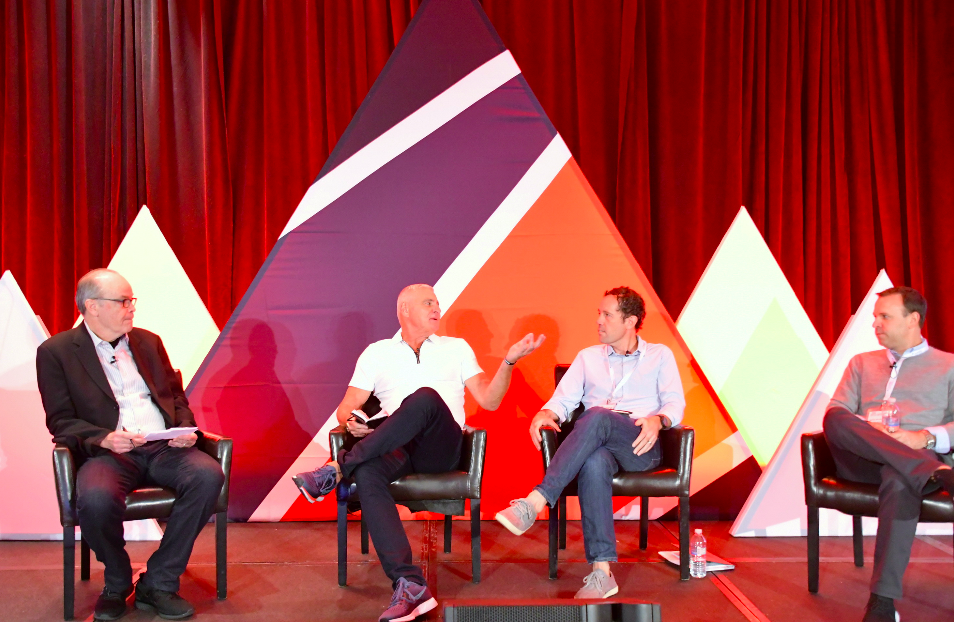Whether its coaches for BSN Sports, runners for Fleet Feet or the local Latino community for WSS, the benefits of engaging communities was spelled out loudly at a session featuring a number of retailers at the SFIA’s recent Industry Leaders Summit in Denver. The challenges in driving consistent engagement were also heard.
All three participants in the panel – including Jared Drinkwater, CMO, BSN Sports; Joey Pointer, CEO, Fleet Feet Sports; and Rick Mina, president, WSS – agreed that driving community engagement comes down to a company’s culture and that’s driven by employees working the store.
“When we talk about our strategic priorities, I think people and culture are first and foremost,” said Pointer at the session moderated by Mark Sullivan, editor, Running Insight. “But you have to take care of your employees first and foremost because they’re ultimately going to take care of your customers.”
In the run specialty channel, the community-oriented focus requires individual commitments at the store level. As an example, Pointer noted how a Fleet Feet franchise owner in the Charleston, SC area gets up at 6:00 a.m. every Saturday morning during the summer to hand out 500 water bottles to runners crossing the Arthur Ravenel, Jr. Bridge over the Cooper River.
Fleet Feet’s overall mission is to “inspire people to move and lead healthier and active lifestyles,” but that that mission has to align with vision and core values of the local owners and staff, such as those evidenced by the South Carolina franchise owner.
Pointer admitted that establishing core values across franchisees has become a bigger challenge as the chain has expanded to 172 doors. Added Pointer, “I’d say culture is the hardest thing that we do.”
For WSS, an 81-unit sneaker store largely in Southern California, the primary customer is Hispanic and a primary step that supports community engagement is hiring locals to work the stores, according to Mina. Over 90 percent of the chain’s associates are Hispanic. Said Mina, “It’s a truly neighborhood business.”
Local hiring has supported a “very dedicated” team of managers with the average manager at the company for 12 years. But local hiring also supports a loyal following of customers. Said Mina, a former executive at Foot Locker, “We have a lot of people who come in and have grown up with the company. It’s something [those in the neighborhood are] very appreciative of, especially in areas where jobs are scarce and good jobs are even scarcer.“
A particularly telling statistic is that shrink is less than 1 percent for WSS in an open-stock model. Said Mina, “It gets back to the community. They care. They want to make sure their friends are there working.”
Drinkwater said BSN is the nation’s largest supplier of team sports equipment and apparel. The company considers its 920 sales professionals “mobile retail outlets” as they meet individually with high school and college coaches across the country.
The goal of BSN’s sales professionals is “to make the coaches lives better and easier” and a primary way the company has tried to encourage that is by making their reps’ lives easier. Said Drinkwater, “If your employees don’t love you, your customers won’t.”
Technology has played a role in helping BSN’s sales professionals operate more efficiently. But Drinkwater said BSN has also benefited from “a pretty big mission and brand transformation” over the last six months that has helped BSN’s rep team reframe how they see their roles.
The change came after Drinkwater joined BSN following marketing stints at PepsiCo and Yum Brands and spent the first six months on the road with reps to gain a better understanding of the team industry. He found that the reps approached their role as “super transactional” with a focus on securing orders while the decision making around products for coaches is “very emotional.”
Coaches, he said, “care greatly about the kids that they’re working with. They’re not in their jobs for the money. They’re here to impact kids’ lives.”
Drinkwater said doing a better job reframing rep’s roles from “getting up in the morning to just sell sporting goods” to helping free up coaches’ time to help kids on the field “really resonated with our sales people. We’ve seen a resurgence in convergence.”
Beyond supporting BSN’s internal culture, the reframing has enhanced BSN’s external culture. With coaches often feeling under-appreciated, Drinkwater said BSN came up with a brief branding video that spoke to how coaches transform players’ lives that resonated with coaches. Said Drinkwater, “Just reframing what your company is all about and why you do what you do can be a really powerful way to galvanize a large sales organization.”
One way Fleet Feet encourages franchises to reinforce core values is by encouraging them to hand out inexpensive plastic trophies once to month to staff members that have done something that speaks to those values. The winners are voted among staff. Said Pointer, “It teaches people to look for those sort of values among their colleagues.”
Pointer also pointed to examples of how franchises have inspired each other. A Fleet Feet store in Houston began sharing images of flooding devastation from Hurricane Harvey online and within 24 hours all of Fleet Feet’s stores across the country began collecting shoe donations for the victims. A similar outpouring came following the fires in Santa Rosa. Said Pointer, “It’s not just us. People generally want to do good. We’re fortunate that our places can sort of facilitate that.”
WSS has a formal WSS Cares! programs that supports community events and the retailer holds about 400 large and smaller events in its communities. Said Mina, “People really enjoy them because they’re very focused on things in their lives. I think that’s important. You can’t have a company where you’re doing things that people don’t care about.”
Internally, Mina said employees across levels have to “buy into the strategy” in driving a strong culture, and he believes WSS benefits from strong alignment at the senior level. He said, “The executive team is all focused on exactly the same thing. We communicate. We listen to each other. And most of all it’s always been about respect. Respecting each other. Respecting our customers. And it works. It really does work.”
The executives also talked how technology is reshaping their businesses.
At WSS, recent investments include an advanced POS system, a new merchandising platform and larger state-of-the art distribution center. The chain has invested in iPads for associates to help customers check out quicker as well as in more sophisticated tools manage inventory.
Fleet Feet introduced a new fitting process at the store level that enables in-store staffs to gain 3D-images of runners’ feet. Pointer expects Fleet Feet will scan over a million feet this year and the data will be used for shoe recommendations. Through Superfeet, Fleet Feet will be introducing 3D-printed insoles this fall with customized footwear to follow.
Fleet Feet also introduced a new loyalty program that rewards members when they log their miles on social media via a Garmin device. Said Pointer, “We want to reward our customers for actually using the product.”
Drinkwater said BSN underwent a massive tech upgrade more than a decade ago but continues to seek out ways to reduce friction in the ordering process. He noted that some team orders in the industry are still done with carbon copy paper. BSN’s sales reps are able to use iPads that not only show a coach a virtual catalog for ordering but ensures the items are in stock.
BSN also has one of the foremost experts on physical education (PE) on its staff who has written a free curriculum for PE that’s used by 44,000 PE teachers across the country. Drinkwater said BSN looks at the educational content as just another way to “add value” to coaches’ lives.
The session didn’t explore much of the disruption facing retail cause by mobile phones and digital technologies, except the agree that consumers expect stores to be have online delivery, in-store pick-up, pick-up at other locations and other omnichannel options. Said Mina, “Being able to offer all these choices is part of the game.”
Pointer half-joked that he welcomed the disruption. He said, “I like the retail apocalypse because that means not everybody else is trying to crowd into our space. So whoever you are, I’d like to continue that story. It’s good for us. It leaves us a lot of white space.”
Image courtesy SFIA
















